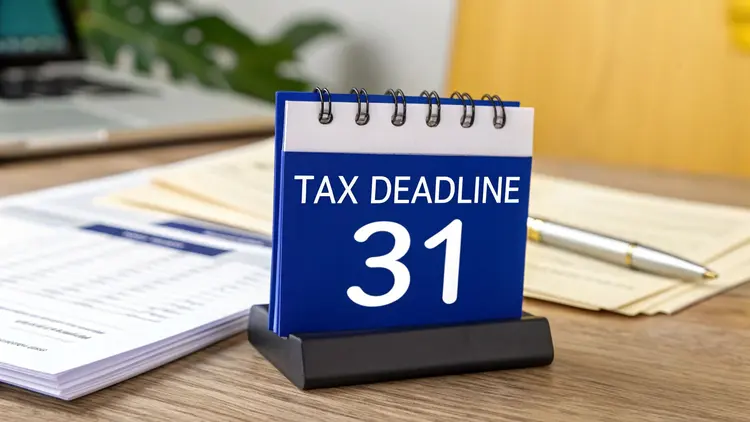
Tax season is here in Australia! For most people who lodge their own tax return, the key date to circle on your calendar is 31 October. But if you use a registered tax agent, that deadline often gets pushed to 15 May of the next year. Knowing your specific tax return due date is critical—it helps you avoid ATO penalties, get your refund faster, and manage your finances without stress.
Tax time in Australia can feel like a national sport with a ticking clock, but getting a handle on your specific lodgement deadline is the secret to keeping things calm. Knowing this date isn’t just about ticking a box; it’s a fundamental part of managing your finances and staying in the good books with the Australian Taxation Office (ATO). Missing the deadline can lead to late lodgment penalties and delayed refunds.
Here are the most important dates you need to know for the financial year ending 30 June 2025:
Australia’s tax system has been around for a long time, and its deadlines are well-established. Your specific tax return due date varies based on how you lodge. You can learn more about the history of Australia’s tax system from the Treasury.
When it comes to filing your taxes in Australia, how you choose to lodge your return is one of the biggest factors influencing your deadline. Your personal situation combined with your lodgement method ultimately sets your specific tax return due date.
If you’re a DIY taxpayer and plan to lodge your own return through the myGov portal, there’s one date you absolutely need to circle on your calendar: 31 October. This is the standard, non-negotiable deadline from the ATO for anyone self-lodging.
This is where things get interesting. By signing up with a registered tax agent before the 31 October deadline, you typically gain access to their special lodgement program. For most individuals, this pushes your filing deadline all the way to 15 May of the next year. This extra time is a strategic advantage, giving you and your agent breathing room to prepare an accurate return.
If you’ve recently started a business and registered for an ABN, don’t mix up your income tax return (ITR) deadline with your Business Activity Statement (BAS) due dates. Your first ITR will follow the standard deadlines above, but your BAS filings will have their own separate quarterly or monthly schedule.
If you’re behind on filing taxes from previous years, the ATO will likely have you on their radar. They may flag you and set an earlier, firm deadline for your current year’s return. You may also lose eligibility for the usual agent-lodgement extensions as a way of getting you back on track.
Putting off your tax return might feel harmless, but the Australian Taxation Office (ATO) doesn’t see it that way. What seems like a minor delay can quickly turn into a surprisingly expensive problem.
While everyone knows you have to meet your tax return due date, the smartest move is to file early. This isn’t just about ticking a box; it’s about seeing your tax return as a financial opportunity.
As far back as 2019, most people had already switched to lodging through the ATO’s myTax platform. This trend towards online submissions has massively accelerated how quickly we can get our tax done. If you’re curious, you can discover more insights about Australian tax lodgement trends for yourself.
Sometimes life gets in the way. The ATO understands that unforeseen circumstances can make it difficult to lodge on time. They may offer relief or extensions for taxpayers affected by natural disasters (like floods or bushfires) or those experiencing serious personal hardship.
If you find yourself in this situation, it’s crucial to be proactive. You can contact the ATO or ask your tax agent to request a deferral on your behalf. Don’t just ignore the deadline. For more information, you can visit the official ATO relief request page on their website.
A smooth and stress-free tax time doesn’t just happen on the day you lodge. It all comes down to good preparation. Being organised is your secret weapon to hitting the tax return due date Australia without the last-minute panic.
Think about it this way: the average Aussie spent around 5 hours completing their personal tax return recently. Getting your ducks in a row beforehand can slash that time dramatically. You can see for yourself how preparation impacts completion times and appreciate why it’s worth the effort.
Here’s a checklist of what you’ll need:
For a lot of Aussies, the best part about using a registered tax agent is the later due date—often pushed out to 15 May. But honestly, that’s just the tip of the iceberg. The real value is having an expert in your corner.
Don’t let the tax return due date Australia catch you by surprise. Remember, if you plan to lodge your own return, your deadline is 31 October. If you want the flexibility of a later deadline and the peace of mind that comes with expert help, now is the time to act.
Encourage readers to book early with a registered tax agent to secure an extended deadline and a stress-free tax season. Reach out to a professional today to get started.
The information on this website is for general informational purposes only and should not be considered financial, taxation, or legal advice. While we strive for accuracy, Nanak Accountants does not guarantee the completeness or reliability of the content. Laws and regulations change over time, and we recommend consulting a qualified professional before making any financial or business decisions. Nanak Accountants is not liable for any loss or consequences arising from reliance on this information. For personalised advice, please contact Nanak Accountants directly.